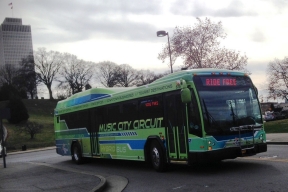Transit
Transit is shared passenger transport available to the general public. Public transportation or mass transit includes passenger buses, vans, trolleys, trains, subways and ferries. Transit operations can be public or private. Mass transit is generally more energy efficient than other forms of travel. When people walk, bike or roll to transit stations or stops, they benefit from increased physical activity.
What are the health benefits of transit?
Even small increases in physical activity lead to meaningful improvements in health. When people walk, bike or wheelchair roll to transit stops, their physical activity increases. When people walk to their transit stops, they often don’t even think about the health benefit.
Another health benefit of transit is improved air quality. Poor air quality leads to increased rates of cardiovascular disease, respiratory illness and asthma attacks. People with pre-existing medical conditions may be at greater risk for adverse health outcomes from poor air quality.
Mass or public transit also reduces the impact on land use. This leaves opportunity for more open and green spaces. Transit also is safer than automobile travel. People who use transit are less likely to be physically injured compared to people who drive cars and might have a crash.
The Tennessee Department of Health supports transit as an effective way to reduce injuries and chronic illness.
How is transit good for the environment?
Transit benefits the environment in many ways. One way is access to transit allows for more people together in fewer places. This encourages sprawl reduction and leaves more natural, undeveloped land. Another is that is reduces the use of natural resources. Perhaps the easiest to understand benefit to the environment is better air quality. Moving around in fuel-burning automobiles creates air pollution. Automobile emissions include particulate matter (PM), nitrogen oxides (NOx) and sulfur oxides (SOx). Some air pollutants react in the atmosphere to make another irritating pollutant called ozone. Unfortunately, areas with lots of traffic congestion can have poorer air quality. The U.S. Environmental Protection Agency’s AirData website shares air quality monitoring data.
How does transit aid prosperity?
Transit options are an important feature of communities. People want to choose whether they walk, drive or ride transit. People want communities that have connectivity, safety, conveniences and other amenities. In addition to improving physical and mental health, promoting pedestrian friendly communities tends to build more vibrant neighborhoods and economically prosperous downtowns. Places with transit options tend to maintain property values.
Who are some of Tennessee’s transit authorities?
There are several transit authorities in Tennessee. Some of the bigger ones are:
- Nashville WeGo Public Transit (WeGo)
- Regional Transportation Authority of Middle Tennessee (RTA)
- Chattanooga Area Regional Transportation Authority (CARTA)
- Clarksville Transit System (CTS)
- Kingsport Area Transit Service (KATS)
- Knoxville Area Transit (KAT)
- Memphis Area Transit Authority (MATA)
What about people with special needs?
For some people, transportation is not so simple. This is especially true for people who need to use assistive devices or wheelchairs to get around. Many public transit buses, shuttles or train cars have been designed to be used by most people. Although limited, paratransit or other specialized transit services may be available for people with disabilities or unique circumstances.
Where to get more transit resources?
Visit the webpage for the Tennessee Department of Transportation’s Office of Public Transit who is responsible for:
- Transit Planning, Capital and Operating Assistance - Urbanized and Non-Urbanized areas,
- Elderly/Disabled Transportation Program,
- Statewide Student Internship Program,
- Promotion of efficient transit systems through the coordination of all available resources, and
- Research and technical assistance on all aspects of public transportation.
Government partners
Tennessee Department of Transportation
www.tn.gov/tdot.html
Centers for Disease Control and Prevention (CDC)
Transportation and Health
www.cdc.gov/healthyplaces/healthtopics/transportation/default.htm
U.S. Environmental Protection Agency
Smart Growth - Transportation
www.epa.gov/smartgrowth/smart-growth-and-transportation
Additional resources
Pedestrian and Bicycle Information Center
Linking to Transit
www.pedbikeinfo.org
Helpful documents
Tennessee Housing Development Agency
Transportation as a Key to Housing Affordability
s3.amazonaws.com/thda.org/Documents/Research-Planning/Housing_Transportation_Brief.pdf
